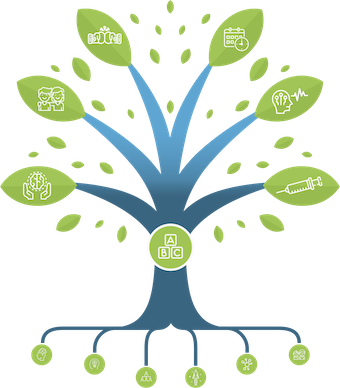Interesting facts on sleep and migraine
Sleep is essential to the good function of the brain Without any sleep for many days, humans start to hallucinate, then die. Sleep is an active process of the brain, involving many neurotransmitters and what we call «the biological clock». Our electric rythms change during sleep.
Here are two other interesting things that happen during sleep that may be relevant to migraine.
1. During sleep, the brain recharges its battery (literally). The energy of the brain comes from a molecule called ATP. When it releases energy, it becomes ADP. During sleep, chemical processes allow ADP to be transformed back to ATP and be ready to fuel our brain the next day.
2. During sleep, the brain cleans itself. The brain has a special system to get rid of «toxins» or waste from all chemical activities of the day. It’s called the glymphatic system (you got it, it is similar to the lymphatic system, but for «glia», the supportive cells for neurons). Without deep sleep, the doors of the glymphathic system do not open, and the «toxins» accumulate. Nothing good for the brain!
Migraines starting at night…is it only me?
Deep sleep or early morning migraines are vicious because you cannot treat them early. You wake up when the attack is well installed. It seems paradoxical that sleep could trigger attacks when it is also a treatment. The mechanisms involved are probably different. Attacks disrupting sleep are common, especially after the age of 40 (yes, our sleep cycles change as we hmmm…age). Using a fast-acting acute treatment like a spray or an injection may be helpful.
Sleep as a treatment of the migraine attack…why?
Sleep has been known to be a good treatment of the migraine attack since centuries. We know that sleep is essential to human survival. Sleep modifies the neurotransmitter balance in the brain, and as described it recharges the ATP batteries and cleans up waste products. If migraine is in part a protective mechanism used by the brain when it’s overloaded, then it makes sense that sleep would be helpful.
Detecting and treating sleep apnea can be a life changing move for a migraine sufferer
Obstructive sleep apnea is a narrowing of the upper airways (read: throat) causing a reduction of airflow during sleep. The oxygen supply in the blood is reduced, causing surges in blood pressure and mini-awakenings, sometimes with gasps for air. This impacts your cardiovascular health, brain, and migraines. Sleep apnea is associated with obesity and a thick neck… but not always. Different tests are available to screen for sleep apnea, and many treatments are available.
Sleep, migraine and menopause: the infernal trio
Menopause causes nocturnal awakenings in 80% of women, mainly due to an imbalance of body temperature regulation. This can increase the frequency of migraines. There are ways to reduce the symptoms related to menopause. The risk-benefit of hormone replacement therapy must be discussed with your physician. (See this post)
Other headaches that may present mostly during sleep:
- Hypnic headache (occurs exclusively during sleep)
- Cluster headache (related to our biological clocks)
- Glaucoma (high pressure in the eyes)
- Cervicogenic headaches (neck posture)
Headache that typically are present on awakening
- Sleep apnea (usually resolves after 1-2 hours)
- TMJ disorders and bruxism (jaw pain)
** Both sleep apnea and TMJ disorders are associated with chronic migraine, following the Ping Pong theory. - Headaches caused by a high pressure in the head
I wake up with headaches….is it a brain tumor?
True enough, new onset headaches occurring mostly when lying down can be a red flag. When we lie flat, our blood is free to flow toward our brain through the jugular veins, and that increases the pressure inside the skull. If the pressure is already high, it can cause headaches. But in the end, if there is a history of migraine and the attacks are now starting during the night, another diagnosis is less likely. Discuss any new headache or change in your headache pattern with your physician.
What about nightmares? Can they be caused by migraine preventives?
Venlafaxine (Effexor) and propranolol (Inderal) are known to cause nightmares in some people. Nightmares can also be part of the post-traumatic stress disorder, a serious condition that should be managed.
Ready to improve your sleep? Read our Ultimate List for sleep here. (See this post)
Read more about Caffeine HERE.
REFERENCES
Russell MB, Kristiansen HA, Kvaerner KJ. Headache in sleep apnea syndrome: epidemiology and pathophysiology. Cephalalgia. 2014;34(10):752-5.
Evers S. Special issue on headache and sleep. Cephalalgia. 2014;34(10):723-4.
Freedom T, Evans RW. Headache and sleep. Headache. 2013;53(8):1358-66.
Post#715
Categories
THE MIGRAINE TREE
- BRANCHES
- ACUTE TREATMENTS
- DEVICES AND NEUROMULATIOIN
- PREVENTIVE TREATMENTS
- PROCEDURES AND INJECTIONS
- SELF-CARE AND LIFESTYLE
- SOCIAL LIFE
- TRUNK
- ROOTS
OTHER CATEGORIES




